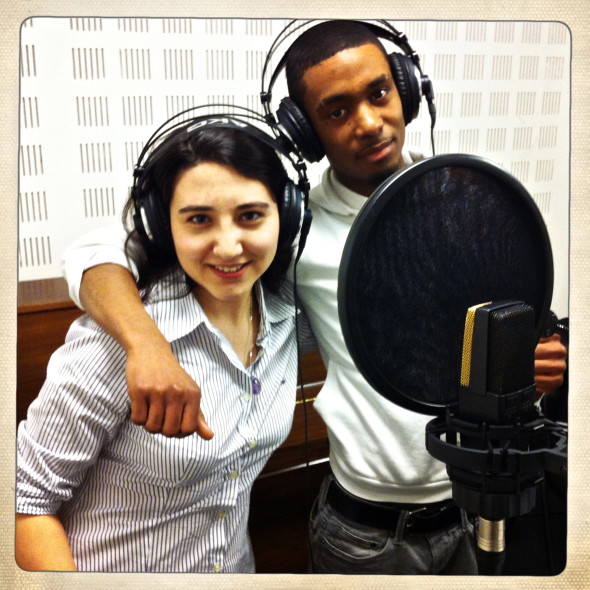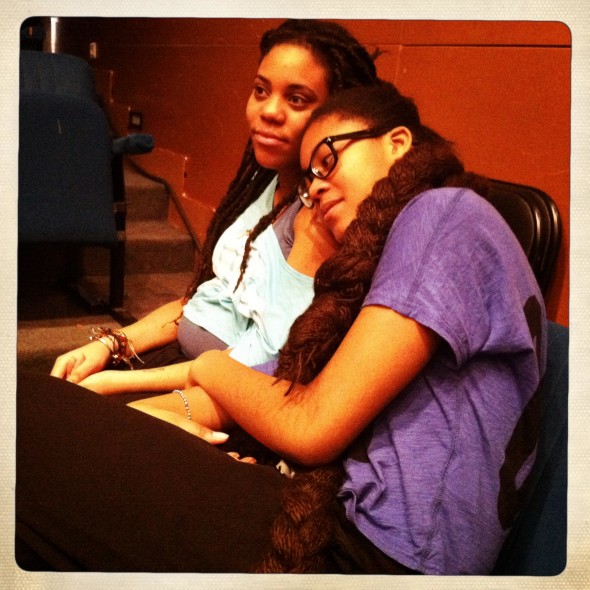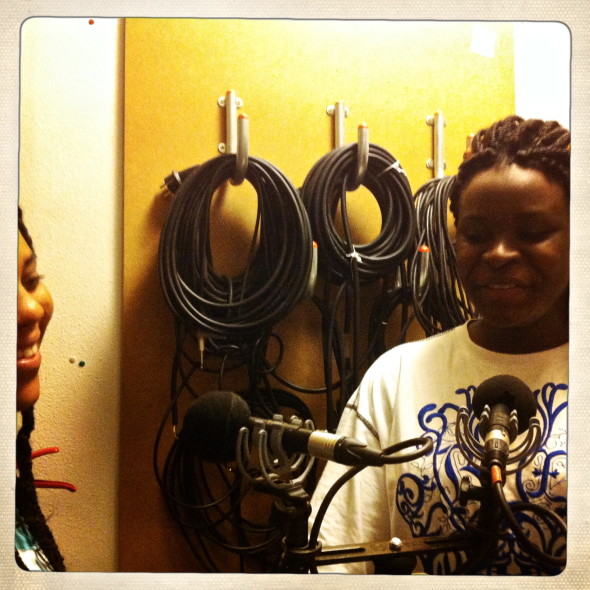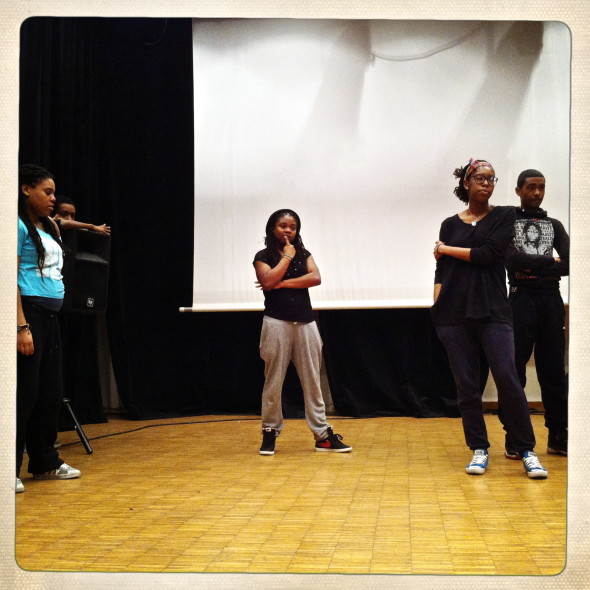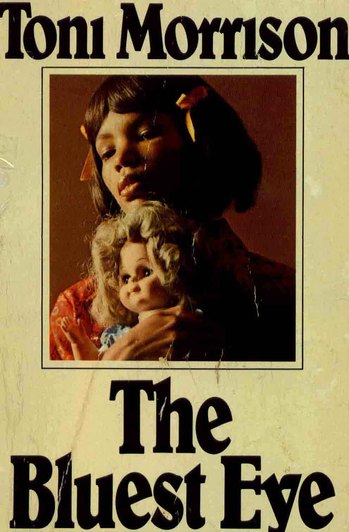
BBN (Du Bleu dans l’œil, des Bleus dans l’Âme) is an adaptation of Toni Morrison’s novel The Bluest Eye (1970) by Martine de Koninck and Collectif Fusion, based in Villiers-le-Bel, 2012-2013,
a mixed performance involving teenagers from Villiers-le-Bel, suburb of Paris, american students from the NYC University in Paris and from Paris 8 University.
Participants : Méline Fabèle, Flora Fabèle, Ophélie Fabèle, Steven Kayenga, Amin Medarbi, Ornella Mormin, Mickaël Mormin, Fatmagul Yaman, Pamela Kenmoé, Vanessa Sylvanise, Martine De Koninck, Isabelle Dufau, Amandine Froye.
Soundtrack – original materials, recordings, research, editing & mixing : Gaël Segalen
Voices : participants, existing recordings and Toni Morrison
Additional samples : Jeanne Lee “Yeh Come T’be”, Soulphiction “Black Woman”, Frank Stokes “Right Now Blues”, Whistler and his Jug Band “Pig Meat Blues”, Haitian Rara “Vapeur”, Sally died and other children’s songs, Blagovest “Partchim”, Blagovest “Festivechime”, Milo “femmes-whispers”, Ralph Bakshi “Coonskin”, Scott Bradley “Blue Cat Blues”, Anima “Gotejando”, Toni Morrison Audio “The Bluest Eye”
Prologue 1
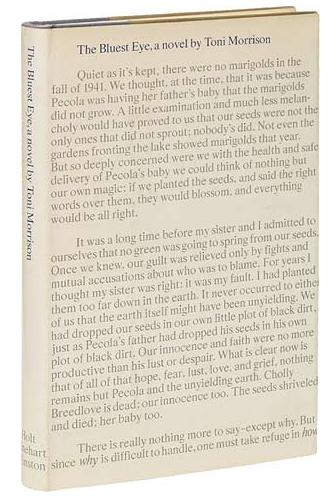
Here is the houseit is green and white it has a red door it is very pretty here is the family mother father dick and jane live in the green-and-white house they are very happy see jane she has a red dress she wants to play who will play with jane see the cat it goes meow-meow come and play come play with jane the kitten will not play see mother mother is very nice mother will you play with jane mother laughs laugh mother laugh see father he is big and strong father will you play with jane father is smiling smile father smile see the dog bowwow goes the dog do you want to play do you want to play with jane see the dog run run dog run look look here comes a friend the friend will play with jane they will play a good game play jane play
Overview
Nine-year-old Claudia and ten-year-old Frieda MacTeer live in Lorain, Ohio, with their parents. It is the end of the Great Depression, and the girls’ parents are more concerned with making ends meet than with lavishing attention upon their daughters, but there is an undercurrent of love and stability in their home. The MacTeers take in a boarder, Henry Washington, and also a young girl named Pecola. Pecola’s father has tried to burn down his family’s house, and Claudia and Frieda feel sorry for her. Pecola loves Shirley Temple, believing that whiteness is beautiful and that she is ugly.
Pecola moves back in with her family, and her life is difficult. Her father drinks, her mother is distant, and the two of them often beat one another. Her brother, Sammy, frequently runs away. Pecola believes that if she had blue eyes, she would be loved and her life would be transformed. Meanwhile, she continually receives confirmation of her own sense of ugliness—the grocer looks right through her when she buys candy, boys make fun of her, and a light-skinned girl, Maureen, who temporarily befriends her makes fun of her too. She is wrongly blamed for killing a boy’s cat and is called a “nasty little black bitch” by his mother.
We learn that Pecola’s parents have both had difficult lives. Pauline, her mother, has a lame foot and has always felt isolated. She loses herself in movies, which reaffirm her belief that she is ugly and that romantic love is reserved for the beautiful. She encourages her husband’s violent behavior in order to reinforce her own role as a martyr. She feels most alive when she is at work, cleaning a white woman’s home. She loves this home and despises her own. Cholly, Pecola’s father, was abandoned by his parents and raised by his great aunt, who died when he was a young teenager. He was humiliated by two white men who found him having sex for the first time and made him continue while they watched. He ran away to find his father but was rebuffed by him. By the time he met Pauline, he was a wild and rootless man. He feels trapped in his marriage and has lost interest in life.
Cholly returns home one day and finds Pecola washing dishes. With mixed motives of tenderness and hatred that are fueled by guilt, he rapes her. When Pecola’s mother finds her unconscious on the floor, she disbelieves Pecola’s story and beats her. Pecola goes to Soaphead Church, a sham mystic, and asks him for blue eyes. Instead of helping her, he uses her to kill a dog he dislikes.
Claudia and Frieda find out that Pecola has been impregnated by her father, and unlike the rest of the neighborhood, they want the baby to live. They sacrifice the money they have been saving for a bicycle and plant marigold seeds. They believe that if the flowers live, so will Pecola’s baby. The flowers refuse to bloom, and Pecola’s baby dies when it is born prematurely. Cholly, who rapes Pecola a second time and then runs away, dies in a workhouse. Pecola goes mad, believing that her cherished wish has been fulfilled and that she has the bluest eyes.
seq 1
seq 2 + interlude
seq 3
seq 4
seq 5
seq 6
Audio clip: Adobe Flash Player (version 9 or above) is required to play this audio clip. Download the latest version here. You also need to have JavaScript enabled in your browser.
Audio clip: Adobe Flash Player (version 9 or above) is required to play this audio clip. Download the latest version here. You also need to have JavaScript enabled in your browser.
Audio clip: Adobe Flash Player (version 9 or above) is required to play this audio clip. Download the latest version here. You also need to have JavaScript enabled in your browser.
Audio clip: Adobe Flash Player (version 9 or above) is required to play this audio clip. Download the latest version here. You also need to have JavaScript enabled in your browser.
Audio clip: Adobe Flash Player (version 9 or above) is required to play this audio clip. Download the latest version here. You also need to have JavaScript enabled in your browser.
Audio clip: Adobe Flash Player (version 9 or above) is required to play this audio clip. Download the latest version here. You also need to have JavaScript enabled in your browser.
